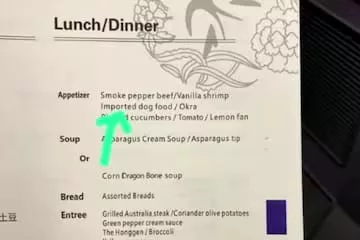Chinese Airlines menu shows dog food ; Read to know more.

Chinese Airlines menu shows dog food ; Read to know more.
Travelling on a business class flight usually entails receiving top-notch treatment and access to the best amenities. However, a recent incident involving a Chinese airline’s flight menu has raised concerns about the quality of service provided in business class.
A digital creator named Conrad Wu shared a photo on Facebook showing an in-flight menu that listed “imported dog food” as an appetizer option. Wu’s post quickly garnered numerous comments, with many questioning the airline’s standards.
A Facebook user left a comment on this post, mentioning the pet-friendly policy of allowing dogs to travel in the cabin. The user also shared an experience of sitting next to a lady with a small service dog. In response, another user made a sarcastic remark about the quality of dog food compared to the actual animal.
Upon a quick glance at the menu, it becomes apparent that there are some peculiarly named dishes such as “Corn Dragon Bone soup” and “Shark’s fin Chinese vegetable”. A Facebook user pointed out that the majority of the English on the menu is incorrect, stating “It’s quite comical for an international airline.”
The listing for “imported dog food” appears to be the result of a misinterpretation of a Chinese dish when translated into English. In 2019, Anand Mahindra, an industrialist, shared a picture of a Chinese food menu that mistakenly labeled a dish as “Delicious roasted husband.” Alongside the photo, Mahindra humorously expressed his hesitation in visiting the restaurant with his wife, as he didn’t want her to get any unconventional ideas. Likewise, in 2015, a different photo of a Chinese menu circulated on X, featuring a dish labeled as “Human skin.”
In 2018, Emily Monaco, a food writer, discussed the frequent errors in menu translations in an article for Atlas Obscura. Monaco pointed out that the majority of these mistakes occur when translating between alphabet-based languages such as English and French, and ideographic languages like Chinese. The problem of mistranslation is further compounded by the fact that most translators are not experts in the field and rely on literal translations. For example, the Cuban dish ‘ropa vieja’, which consists of shredded beef, is literally translated as “old/ripped clothes” in English. Similarly, the Mexican dish “tacos sudados” translates to “sweaty tacos”.









